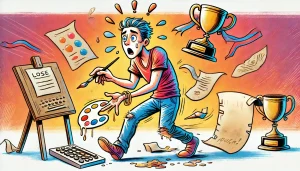Ever felt that sinking feeling when your once-perfect skills suddenly abandon you?
To no longer have the skill or ability to do something as well as you once could, typically due to lack of practice or time away from the activity.
Have you ever returned to a beloved hobby only to find your skills have mysteriously vanished?

This common experience has a name: losing your touch.
This idiom describes that frustrating moment when something that once came naturally now feels foreign and difficult.
Whether it’s cooking, sports, art, or public speaking, this phrase captures the temporary decline in performance that happens when we step away from regular practice. The good news? With patience and persistence, your touch can always be regained.
Essence of “Lose One’s Touch”
Definition and Core Meaning
When someone says you have “lost your touch,” they typically mean that you no longer perform at the same level of expertise as before.
This phrase applies to a wide range of activities—from cooking to sports and from writing to public speaking.
It suggests that your once-polished skill has become a little rusty due to a lack of use, practice, or even motivation. In other words, you might feel a bit off balance, as if something you once did with ease now requires extra effort.
Where It May Come From
The precise origin of this idiom is not universally agreed upon. Some people mention old billiards halls, where a player with perfect aim would suddenly miss easy shots and be said to have “lost his touch.”
Wherever it began, the idiom has carried over into modern English usage, helping people describe a drop in performance that might be temporary or, in some cases, permanent.
True Stories & Examples
1) The Chef Who Forgot His Magic
Imagine a once-celebrated chef who could craft gourmet feasts effortlessly. He took a break for several years, then returned to the kitchen to replicate his signature dish.
To everyone’s surprise, the results were bland and forgettable. After one taste, the kitchen staff declared, “He’s lost his touch.” Of course, the chef had not permanently lost his culinary talent, but it had grown dusty from disuse.
With some practice, patience, and a little humility, he eventually rekindled his flair.
2) The Basketball Player’s Fumble
In the sports world, physical conditioning and muscle memory are crucial. Picture a basketball player who was once known for his lightning-fast shots and crowd-pleasing dunks.
He stepped away from the game for a year and rejoined his old team expecting to perform the same magic as before. His first shot soared past the rim and ended up in the stands.
Teammates teased that he had “lost his touch.” Like the chef, a return to fundamentals—dribbling drills, shooting practice, and consistent training—brought him back into shape.
3) The Painter’s Rusty Brush
Even creative fields are not immune to this phenomenon. A painter who has not held a brush for months might feel intimidated by a blank canvas.
Her first strokes could feel awkward, as though she has forgotten how to mix colors or create the exact textures she wants. She might exclaim with frustration, “I’ve lost my touch!”
Yet the second and third attempts usually build momentum, proving that consistent engagement is key to success in any artistic pursuit.
Tips & Uses
Recognizing the Signs
- Difficulty with Basic Tasks
If you find yourself struggling with steps that used to be second nature, you may be losing your touch. - Lack of Confidence
A notable drop in self-assurance is another warning sign. You may suddenly question your abilities in areas where you once felt unbeatable. - Frequent Mistakes
Constant small errors can signal that your skill level is slipping, especially if they are related to fundamentals you previously mastered.
Ways to Regain Your Touch
- Regular Practice
To maintain skills, nothing beats consistent repetition. Whether it is practicing an instrument, throwing a basketball around, or experimenting in the kitchen, routine effort pays off. - Set Small Goals
Break your comeback into tangible steps. Instead of attempting a five-course meal right away, try perfecting one appetizer first. - Seek Constructive Feedback
Learning from those who still have a keen eye or fresh perspective can speed your improvement. A mentor, friend, or professional coach can offer insight that helps restore your lost proficiency. - Stay Encouraged
Remember that losing your touch is rarely permanent. Embrace humorous mishaps and allow them to motivate you toward reclaiming your old mastery.
Two sentences here for a natural break. Laughing at your early stumbles can lessen the pressure and keep you excited about trying again.
Related & Opposite
Similar Expressions
- “Out of practice”: This implies that your skills have faded because you have not used them for a while.
- “Rusty”: Suggests a layer of “rust” on your skill, meaning it can be polished away with enough practice.
Opposite Expressions
- “In top form”: Highlights someone at their best, functioning at peak ability.
- “At the top of one’s game”: Conveys the same notion of excellence and flawless performance.
Other Idioms That Resonate
- “Fall off the wagon”: While often referring to slipping back into bad habits, it can occasionally be used more casually to mean someone has stopped doing something consistently.
- “Back in the saddle”: Conveys the idea of resuming an activity or habit after a break. It pairs nicely with “lose one’s touch,” suggesting a return to form after a slump.
Funny Spin
A Confused Apprentice
Picture a young apprentice overhearing someone proclaim that a master chef has “lost his touch.”
The apprentice imagines the chef’s skill to be a magical tool that went missing, so he sifts through cupboards and drawers trying to find this mysterious “touch.” Only later does he realize it is just a figure of speech.
Moments like this underscore how language can be playful and misleading. When you grasp these idioms, your conversations not only become clearer, but also more vivid and engaging.
MJ’s Comeback: What If?
Although he famously returned with vigor, let’s imagine a scenario in which he had truly lost his shooting skills after retirement. He steps onto the court, the crowd goes wild, and his first shot arcs well wide of the basket.
Spectators might gasp and ask, “Did he just lose his touch?” Of course, in real life, Jordan quickly found his stride again. Yet this hypothetical story reminds us that even the most celebrated icons can experience an off day.
With perseverance and discipline, they bounce back, proving that a “lost” touch can often be regained with effort.
Pop Quiz: Check Your Idiom Skills
Lose One’s Touch

Final Thoughts
If you ever catch yourself saying, “I’ve lost my touch,” take a moment to reflect. Maybe you just need a warm-up or a fresh approach.
Whatever your skill—be it cooking, music, speaking, or sports—staying sharp takes regular practice.
Taking a break doesn’t mean you’ve lost it forever. Small daily efforts, advice from others, or setting personal goals can help you get back on track.



When things feel off, revisit the basics, stay light-hearted, and gradually challenge yourself more.
Skills often get rusty, not lost. With patience and dedication, you can revive them.
So remember: it’s within your power to turn that “lost touch” into a comeback. With persistence, you’ll soon say, “I’ve got it back!”









Comment